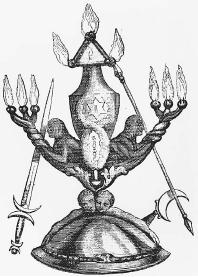Magi
Simon magus (c. first century)
Several cults with widely differing beliefs all bearing the label of "Gnostic" arose in the first century, very strongly competing with the advent of Christianity. Many of the Gnostic sects blended elements of Christianity with the Eleusianian mysteries, combining them with Indian, Egyptian, and Babylonian magic, and bringing in aspects of the Jewish Kabbalah as well.
The first Gnostic of importance was Simon Magus, a Samarian sorcerer, a contemporary of the apostles, who was converted to Christianity by Philip. Although he had been a highly respected magus, Simon continued to be impressed by the remarkable powers of the apostles and their ability to heal and to manifest miracles. When he saw Peter and John baptizing people by the laying on of hands, he asked that he might be taught the power of transferring the Holy Spirit to others. Eagerly, Simon offered to pay the apostles a fee to teach him how to manifest the Holy Spirit. Peter strongly rebuked him for attempting to buy this profound spiritual gift (Acts 8:9–24). Simon accepted the rebuke and asked Peter to pray for his forgiveness. The term "simony" to

Simon apparently brooded over his inability to acquire the Holy Spirit from the apostles, and, according to legend, he fell back on his old ways of sorcery and began to traffic once again with demons. To prove his power, Simon announced to all of Rome that he would fly into the sky and ascend to the heavens, just as Jesus had done. Remarkably, Simon, supported by demons, began to fly upward. Peter, however, fearful that many innocents would be attracted to this false prophet, prayed that God would end Simon's flight. Frightened away by the apostle's prayers, the demons fled the artificial wings supporting Simon, and the magus crashed to the ground, breaking both legs.
The story of Simon Magus fueled the beliefs of generations of magi and alchemists that there was a secret oral tradition that had been passed down from Jesus that had much greater power and authority than the scriptures and epistles offered by the orthodox teachers of Christianity. The Gnostics, like the initiates of the Greek and Egyptian mysteries, sought direct experience with the divine and they believed that this communion could be achieved by uttering secret words of wisdom that God had granted to specially enlightened teachers.

Comment about this article, ask questions, or add new information about this topic: